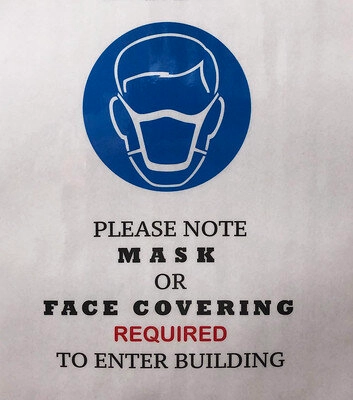
Donate to the Linda McKay-Panos Scholarship Fund

Donate to the Linda McKay-Panos Scholarship Fund
Source: https://www.flickr.com/photos/30484128@N03/
By Linda McKay-Panos
Reposted from LawNow 45(2) with permission
As the COVID-19 pandemic continues to affect the entire world, many governments have passed legislation requiring that face masks be worn in many public locations. This has resulted in claims that the mask requirements violate civil liberties. At the same time, there have been some incidents of individuals being confronted for not wearing masks, yet they have a legitimate exemption from the mask requirements.

By Linda McKay-Panos
Photo: https://www.flickr.com/photos/30484128@N03/
Reposted from LawNow 45(2) with permission
As the COVID-19 pandemic continues to affect the entire world, many governments have passed legislation requiring that face masks be worn in many public locations. This has resulted in claims that the mask requirements violate civil liberties. At the same time, there have been some incidents of individuals being confronted for not wearing masks, yet they have a legitimate exemption from the mask requirements.
For example, the City of Calgary passed The Temporary Face Coverings Bylaw, which went into effect on August 1, 2020. It requires face masks in any indoor space the public has access to, including retail stores, shopping malls, recreation centres, churches and public common spaces in office buildings. The Bylaw provides several exceptions to the public face covering requirements:
Children under 2 years of age
People with underlying medical conditions or disabilities impacting their ability to wear a face covering
People who are unable to place, use or remove a face covering safely without assistance
People who are eating or drinking at public places that offer food or beverage services
People engaging in an athletic or fitness activity
People who are caregiving for or accompanying a person with a disability where wearing a face covering would hinder accommodating the person’s disability
People who have temporarily removed their face covering where doing so is necessary to provide or receive a service (for example, a visit to the dentist)
The Calgary Herald reported that a city survey done in August found 89 per cent of Calgary residents are complying with the bylaw.
Health officials have released evidence and opinions that wearing a mask can reduce the spread and potency of COVID-19, should one be exposed to the virus. Despite the exceptions, and the evidence from experts, there are people who object to wearing masks. Some of these people believe that the COVID-19 evidence is false.
While an adult is generally at liberty to take risks with their own health and safety, there are limits.There are claims that mandatory mask laws violate individual liberties. Section 7 of the Canadian Charter of Rights and Freedoms says that laws and government actions cannot violate one’s rights to life, liberty and security of the person except in accordance with the principles of fundamental justice. Thus, limits must not be arbitrary, grossly disproportionate or overbroad. While an adult is generally at liberty to take risks with their own health and safety, there are limits. Infringements of individual rights can be justified by a pressing and substantial interest. The government must show that the measures it is using are rational, reasonable in the context and proportionate to the affected individual freedom. Krajewska, Sjolin and Marjin argue that if there are exceptions to mandatory mask laws for those who have legitimate reasons, the limits should be reasonable and justifiable in the circumstances. Presumably, the exceptions to the Calgary Bylaw meet this requirement. The authors conclude:
In the context of a global health crisis, collective action to minimize the spread of the virus enhances everyone’s freedom. Declining to adopt mandatory masking leaves the burden on those who are already at risk. It’s also ineffective. At the end of the day, the virus will not care about philosophical differences. When it comes to mandatory masking, neither should we.
Another potential civil liberties restriction in the context of COVID-19 is the freedom of movement. For a discussion of this issue, see Myrna El Fahkry Tuttle’s LawNow article.
The government must show that the measures it is using are rational, reasonable in the context and proportionate to the affected individual freedom.There have also been incidents of individuals not wearing masks being accosted or refused service. Assaulting someone is potentially a crime and not an appropriate response to someone not wearing a mask. Landlords, employers and providers of services normally available to the public must follow human rights legislation. For example, if a person has a mental or physical disability that prevents them from wearing a mask, they cannot be discriminated against. Service providers must accommodate persons with disabilities to the point of undue hardship. Many human rights commissions have published policy statements on Discrimination, COVID-19 and Human Rights, such as the Alberta Human Rights Commission and the Ontario Human Rights Commission.
Human rights and civil liberties issues arise in many contexts, including in this time of COVID-19. Laws such as the Charter and human rights legislation govern the way Canadians and governments must conduct themselves. It is not usually safe to make assumptions about individuals and government policies without adequate information.




2500 University Drive NW
Calgary, AB T2N 1N4
(403) 220-2505
aclrc@ucalgary.ca